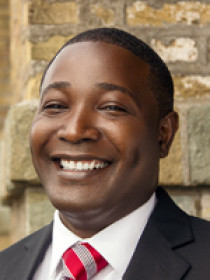
Alvin Thomas
Connect with Alvin
About Alvin
Thomas is a clinical psychologist whose work exists at the intersection of positive youth development and father involvement. Overarching themes in Thomas' writings include (1) youth violence, ethnic identity, and discrimination as critical to positive youth development (2) parenting and father involvement in determining outcomes for youth who witness violence (3) engaging fathers in service provision to children and families. I am exploring the effects of social media use, and police interactions on adolescent development.
Contributions
In the News
Publications
Discusses that Black Americans remain disproportionately affected by the COVID-19 pandemic. Suggests that employment in certain occupations (e.g., essential; frontline) may place individuals at higher-risk for contracting COVID-19. Examines how Black American fathers’ COVID-19 perceived work risk was associated with their individual well-being (COVID-19 diagnosis; depressive and anxiety symptoms; sleep disturbance; sleep quality) as well as spillover into family contexts.
Finds despite their positive intention to increase school safety, zero-tolerance policies may perpetuate racial disparities in health. Mentions zero tolerance refers to school policies and practices that mandate predetermined punishment in response to student misbehavior regardless of the context or rationale for the behavior.
Determines age differences in the effects of a family-based intervention with 278 African American nonresident fathers and their 8 to 12-year-old sons. Assesses fathers’ parenting, sons’ perception of fathers’ parenting, and sons’ intentions to avoid violence (outcome) before and after the intervention.
Explores how African American fathers' own life experiences, especially those related to their work related interactions shapes the kind of racial socialization messages that they convey to their sons. These racial socialization messages are meant to prepare their sons for navigating the often problematic racial contexts inherent in much of American life.
Discusses how a brief intervention on emotion management evidenced some changes to behavior for boys in a group home setting in the Caribbean. The experiences of the 14 boys in this intervention are reported as well as an overview of the residential setting in which the boys are housed.
Reviews the literature examining fatherhood as a critical social context for promoting men’s health across generations. Describes theoretical model and incorporate findings from research with nonresident African American fathers and sons to show connections between fatherhood and health from a community-based intergenerational health intervention. Highlights how enhancing parenting and quality of relationships with sons can improve fathers’ health behaviors and mental health and shows how the benefits of father involvement can reduce sons’ health risk behavior. Discusses clinical service and policy issues with the potential to improve fathers’ involvement in the lives of their children. Suggests the significance of community-based health programs centered around father engagement that are designed to achieve reciprocal benefits for men and boys as a promising new strategy for reducing men’s health disparities from an intergenerational perspective. Provides examples of findings that are based on tests of theoretical model that incorporates fathers’ health and mental health outcomes.
Demonstrates black boys efficacy to avoid violence, reduces their chances of engaging in violent behaviors, but peers can undermine that efficacy. Parents, on the other hand play a major role in supporting efficacy and thus protecting their sons from this negative outcome.
Explores how Black boys often report lower feelings of neighborhood safety than their parents. Communities where neighbors look out for each other and seem to have shared values make Black boys feel much safer, especially for boys who have witnessed community violence.
Discusses how exposure to violence cannot be thought of as identical for all Black youth - in fact it has differential effects. Families and other environmental risks and protections can significantly alter the outcome for Black youth.